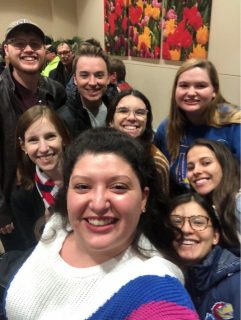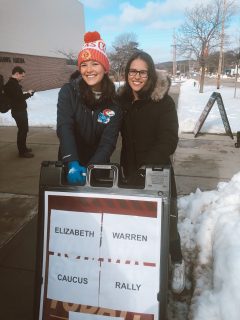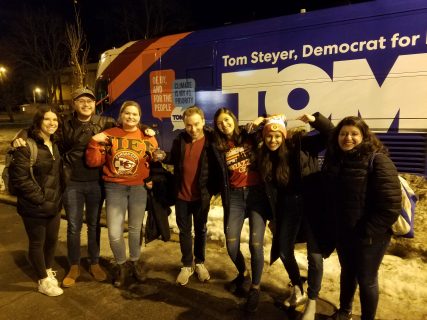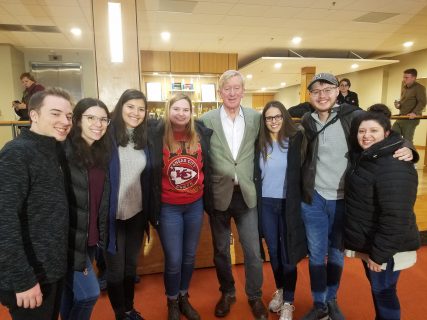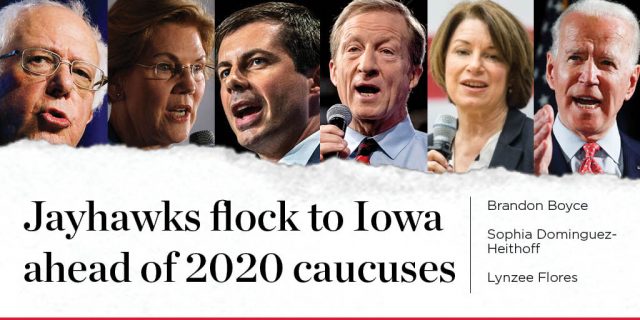
Two months before the spread of COVID-19 became the center of collective national attention in the U.S., political rivals across the ideological spectrum journeyed to Iowa with their teams for a marathon of non-stop campaigning, hand-shaking, and rallies in an all-hands-on-deck final push to amplify their messages and ultimately find a path to victory.
As the events unfolded in the Hawkeye State, back when the democratic race seemed to be anyone’s game, three research teams of undergraduate and graduate students, along with their faculty advisors, from the University of Kansas, South Florida State University, and the University of Alabama went out in the field to see how candidates’ messages were playing with caucus goers.
To learn more, we caught up with KU students Lynzee Flores, a second year Ph.D. student studying political communication; Sophia Dominguez-Heithoff, a senior majoring in political science with a minor in global & international studies; and Brandon Boyce, a senior majoring in communication studies. They explained how they conducted their research and how their findings could reveal insights about the current political mood in the U.S. and American voters’ preferences, biases, and hopes for the country’s future.
How did you conduct your research, and what did you want to find out?
Lynzee Flores: This research was conducted by 3 research teams consisting of faculty, graduate and undergraduate students from 3 universities: University of Kansas, South Florida State University, and the University of Alabama. We collected data through online and paper surveys being distributed in the waiting lines of each democratic candidates’ rally. The survey consisted of approximately 15 questions ranging in different political communication measures such as: political bias, attitudes towards candidates, political communication messaging preferences and demographics.
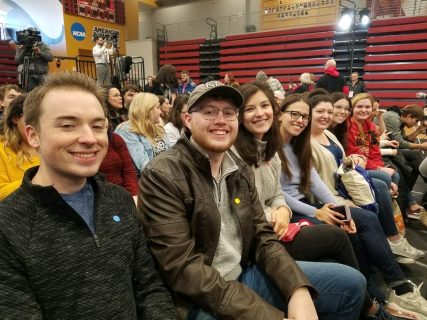
What were your responsibilities during the trip?
Brandon Boyce: We were all tasked with getting caucus goers to fill out a survey, either on paper or by scanning a Qualtrics link that would allow them to take it on their mobile phones.
Sophia Dominguez-Heithoff: My responsibilities during the trip were to get people to fill out or survey. We each had our own iPad and we also had paper copies. We also had to take a class on how to conduct research using human subjects.
Lynzee Flores: I was in more of an administrative and supervisory role, assisting the primary investigator, Dr. Ashley Muddiman, with the logistics of the trip. (i.e. distribution of research materials to undergraduates, navigation to and from rallies, point of contact for questions from undergraduate researchers, etc.)
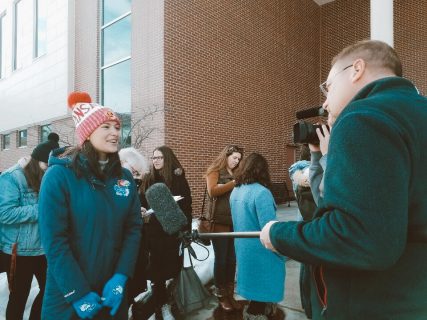
What was your favorite part of the trip?
Brandon Boyce: My personal favorite part of the trip was attending the caucus. I find that having people actually influencing others and getting people to sway to their side is a fundamental part of democracy and for the first time in my life, I think I truly witnessed something that gave me hope that partisan politics can be overcome in U.S. democracy.
Sophia Dominguez-Heithoff: My favorite part of the trip was going to all of the rallies. Specifically, I liked seeing the different dynamics for the candidates. Yang’s rally was particularly lively, and Warren’s had a lot of intelligent questions, Bernie’s felt very uncivil as the crowd booed Hillary Clinton when she was mentioned.
Lynzee Flores: My favorite part of this trip was being able to participate in the political rallies. I have never been to a campaign event and to be able to see every democratic presidential candidate in person was an awesome opportunity for me to help make my decision going into 2020 general election.
What did you gain from the experience that will be valuable to you in the future?
Brandon Boyce: I think the ability to approach people is always important as well as the ability to understand the survey and how to relay that to potential survey-takers. I also find that the coding process of inputting the data is extremely valuable.
Sophia Dominguez-Heithoff: I gained insight on who I want to vote for in the midterms. Also, I learned how draining it is to work for a campaign. The staffers were going a mile a minute.
Lynzee Flores: As a graduate student, being able to be behind the scenes of the research process was a really valuable opportunity for me to see how the work is actually done. I will be able to refer to the challenges and successes of this project in the future when I conduct a study of my own one day.
How had the classes you’d taken at KU, and in your major/minor or program of study prepared you for the experience?
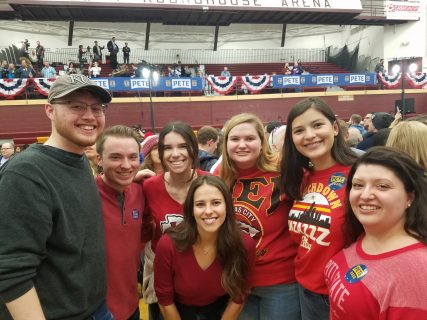
Brandon Boyce: I think both of Dr. Muddiman’s courses were important for different reasons on this trip. Her campaigns course is fantastic and helped to prepare me with speaking to caucus goers, while her COMS 335 course helped prepare me for data input and the ability to understand what survey questions are asking.
Sophia Dominguez-Heithoff: POLS 521 – Mass Media and Politics taught by Professor Muddiman prepared me the most for this research trip. We learned a lot about the systems that we witnessed, and it was also interesting as I was interviewed a couple times because of the giant media presence at the event, I felt a part of the topics that I had learned about the semester prior.
What do you plan to do after graduation?
Brandon Boyce: I am pursuing graduate programs in political communication and rhetoric.
Sophia Dominguez-Heithoff: I will be attending law school at the University of Southern California.
Lynzee Flores: Ultimately, I want to do public service in my career. Options could look like working at the government level as a data analyst, Foreign Service officer or politician. Another option would be to stay in academics and pursue a teaching career. I just like to help others.
Give a shout-out to someone to a prof, advisor or someone else who has been influential during your time at KU:
Brandon Boyce: Both Dr. Ashley Muddiman and Dr. Robert McDonald have been extremely helpful to me throughout my time at KU and have both been crucial to my pursuit of higher education!
Sophia Dominguez-Heithoff: Dr. Mary Klayder has been instrumental in shaping my worldview and she has helped me to navigate where my talents can best serve our changing world.
Lynzee Flores: Dr. Muddiman, thank you for your constant support and belief in me as a young researcher!
What advice would you give student at KU who want to conduct research that involves fieldwork?
Brandon Boyce: Find faculty that has the same interest in you and work with them! Show that you care about the same topics and try to find common ground to do research.
Sophia Dominguez-Heithoff: Talk with your professors! They all have projects that they are passionate about. Maybe you learn about something new or you can have the opportunity to strengthen a topic you are already passionate about.
Lynzee Flores: Do it! It might seem overwhelming but that means it will be worth it. Having a field research experience gives you a completely different perspective than participating in the actual event that you are observing. You never know what you might learn!
What motivates you?
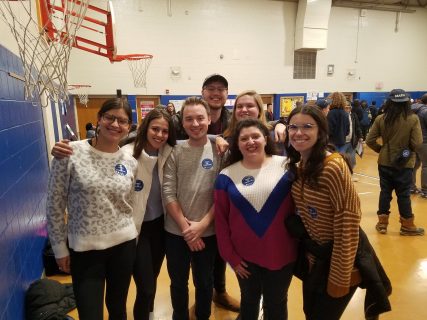
Brandon Boyce: My personal motivation comes from a drive to learn. I think that knowledge is extremely powerful and the ability to better myself through learning has been a common theme throughout my life.
Sophia Dominguez-Heithoff: My family motivates me. I am a first-generation immigrant of Mexico and I am always proud of where I have come from. Further, I am very proud to be an American and I seek to go in to public service law in the future to pay it forward.
Lynzee Flores: God’s plan for my life. I never would have expected to follow this educational path for myself but God has lead me to the opportunities and people here at KU for a reason.
For more information, explore the Department of Political Science, the Department of Communication Studies, and the Center for Global & International Studies at the University of Kansas. Learn more about our students’ research on the College Blog.
